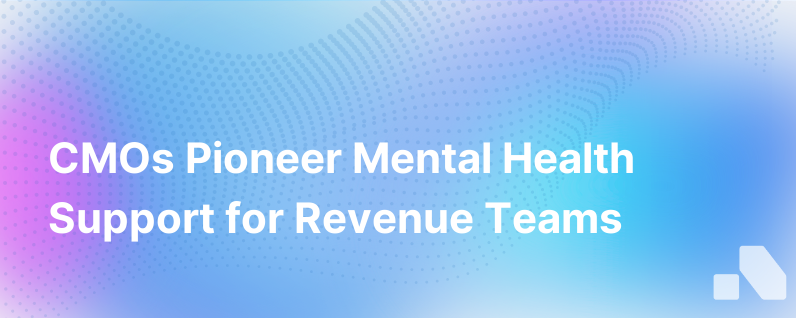Supporting The Mental Health Needs Of Revenue Teams Cmos Lead The Way
Published on August 2, 2023 by David Zhang
In today's high-stress environment, where bottom-line numbers and performance metrics dominate conversations within revenue teams, mental health can end up taking a backseat. Yet, it shouldn't. As Chief Marketing Officers (CMOs) spearhead revenue teams, they carry the responsibility not just for hitting targets, but also for sustaining the overall well-being of their teams.
This piece heralds the pivotal role of CMOs in supporting the mental health needs of their revenue teams, and how their leadership can set the precedent for healthier, more resilient organizations. Let's delve into strategies that CMOs can implement to lead the way.
Mental Health and Revenue Teams: Confronting the Hidden Challenges
CMOs are no strangers to the pressure that comes with ensuring the company's growth and profitability. They, along with their revenue teams, are often in the hot seat to deliver consistent results in ever-changing market conditions. The relentless pursuit of targets can lead to stress, burnout, and anxiety. A host of mental health challenges can result from the pressure-cooker environment of sales and marketing — from performance anxiety to fear of failure and job insecurity.
With data backing up the steep cost of mental health issues in the workplace, it becomes clear that addressing these concerns is not just a duty of corporate social responsibility, but also of financial sensibility. According to the World Health Organization, depression and anxiety disorders cost the global economy $1 trillion annually in lost productivity.
The Role of CMOs in Cultivating Mental Wellness
As the nexus between product development, marketing strategy, and revenue generation, CMOs are uniquely positioned to influence the mental health landscape within organizations. Here's how they can lead the way:
1. Creating a Culture of Openness and Support: CMOs can foster an environment where talking about mental health is normalized. Instituting regular check-ins, offering mental health days, and promoting a safe space for dialogue about stress and workload management encourages a supportive culture.
2. Lead by Example: Leadership is at its most potent when it models the desired behavior. When CMOs prioritize their mental health, be transparent about stress management and maintain work-life boundaries, they encourage their teams to do the same.
3. Provide Training and Resources: Investing in mental health training for managers and enabling access to professional support services shows a commitment to employee well-being. This could involve workshops on stress management, resilience-building, or subsidizing therapy sessions.
4. Restructuring Workloads When Necessary: CMOs can review sales targets and redistribute workloads to manage better the pressure on team members. By ensuring that objectives are challenging yet reasonable, teams can remain motivated without feeling overwhelmed.
5. Promote Holistic Success Metrics: Moving beyond just financial metrics, CMOs can include employee satisfaction, team collaboration, and professional development in their definition of success. This broadens the scope of achievements and alleviates the singular pressure of meeting sales targets.
6. Invest in Tools and Processes that Streamline Work: Introducing automation and AI, like the solutions provided by Aomni, can significantly reduce the manual workload, allowing teams to focus on strategy and engagement rather than repetitive tasks.
The Impact of Mental Health Support on Revenue Teams
There is evidence to suggest that when mental health is prioritized, productivity increases. According to a study by Mind Share Partners, SAP, and Qualtrics, employees who felt their employer supported their mental health were more likely to be satisfied with their job, remain at their company, and recommend it as a good place to work.
For revenue teams, the impact is direct and measurable:
- Reduced Absenteeism: Teams with good mental health are more present and engaged, reducing the cost of lost workdays.
- Increased Creativity and Innovation: Mental well-being supports cognitive functions, thereby enhancing the creativity that is paramount in marketing strategy.
- Improved Collaboration: When team members are mentally healthy, they are better communicators and collaborators, leading to more effective teamwork.
- Enhanced Customer Engagement: Teams who enjoy good mental health can forge stronger connections with customers, driving sales and loyalty.
Mapping the Path Forward
The mandate for CMOs is clear: mental health needs to be an integral part of the conversation around team performance and organizational success. This requires intentional strategies and dedication to transformative leadership practices. It includes:
- Establishing mental health as a key organizational value.
- Communicating this commitment to employees, customers, and stakeholders.
- Regularly monitoring the mental well-being of employees through surveys, check-ins, and informal conversations.
- Seeking continuous feedback from employees on how to improve mental health initiatives.
- Empowering Human Resources to partner strategically in supporting mental health.
- Setting aside resources for mental health programs and professional development opportunities.
In an era where employees crave purposeful work and holistic support, CMOs who champion mental health signify that they are listening and that they care — both for the individual and the collective success of the company. This isn't just good ethics; it's good business. As they say, a healthy mind is a productive mind, and when it comes to revenue teams, productivity translates to profitability.
By following these guidelines, CMOs have the power to revolutionize the workplace, transforming it from a source of stress to a source of strength. And, as they do, they will not only lead their teams to healthier, more productive futures, but they will also pave the way for a corporate culture that values the well-being of its most significant asset — its people.